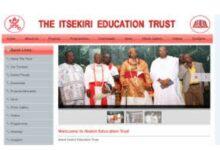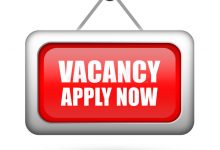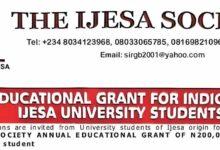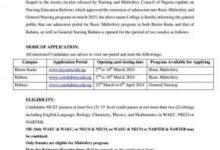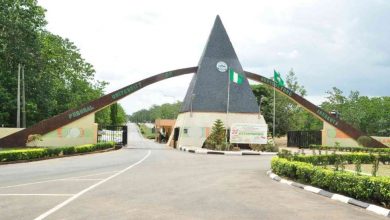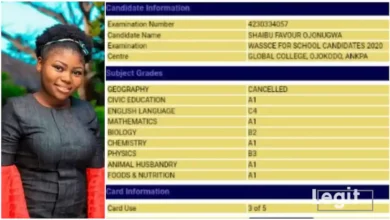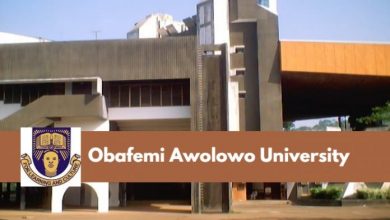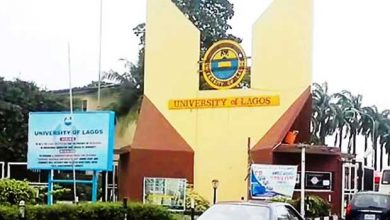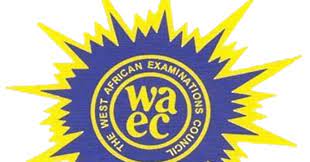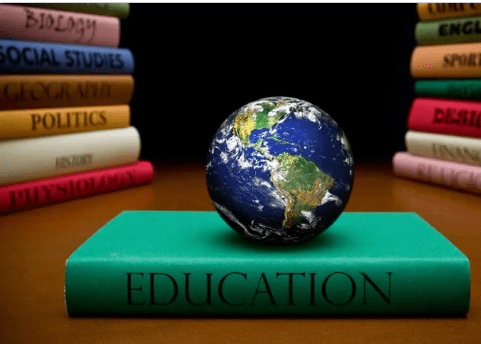
MAJOR PROBLEMS FACING NON-FORMAL EDUCATION PROGRAMS IN NIGERIA
MAJOR PROBLEMS FACING NON-FORMAL EDUCATION PROGRAMS IN NIGERIA – Nigeria still has significant number of out of school children and illiterates. And in its dedication to reduce these numbers, non-formal education programs provide a way to engage both children and adults with unique challenges that limit their ability to access formal education.105 Good Morning Love Messages
These non-formal education programs provide a flexible learning environment and structure for individuals who have difficulty accessing formal education, have missed out on formal education or need to enhance their skills and knowledge.
👉 Relocate to Canada Today!
Live, Study and Work in Canada. No Payment is Required! Hurry Now click here to Apply >> Immigrate to CanadaRead Also: 10 Importance Of Nomadic Education In Nigeria
Non-Formal Education programs are complements the building of a more literate and educated society that can contribute to the achievement of sustainable development goals. Despite the importance of non-formal education programs in Nigeria, they face numerous challenges. This article discusses non-formal education, the problems it faces and possible solutions in Nigeria.
Read Also: 9 Problems Facing Educational Research In Nigeria
Understanding Non-Formal Education Program
Non-formal education refers to education that is provided outside the formal education system, through flexible but structured programs and activities designed to provide learning opportunities to individuals who need to enhance their skills and knowledge and adults.
Non-formal education programs in Nigeria are effected by government agencies and non-governmental organizations to provide education to marginalized and underserved populations, including women, youths, and people with disabilities.MAJOR PROBLEMS FACING NON-FORMAL EDUCATION PROGRAMS IN NIGERIA
These programs can take many forms, including adult literacy programs, vocational training, apprenticeships, and skills acquisition programs, and are often delivered through community-based initiatives or digital platforms to provide wider access to education. Non-formal education programs in Nigeria are crucial in reducing illiteracy and promoting inclusive and equitable education for all.
Read Also: 10 Importance Of Special Education in Nigeria
Major Problems Non-Formal Education Program In Nigeria
- Lack of Adequate Funding: Non-Formal Education programs in Nigeria are not adequately funded, which limits their capacity to provide quality education and support learners. The government and other stakeholders need to invest more resources in NFE programs to improve their effectiveness.
- Inadequate Infrastructure: Non-Formal Education programs in Nigeria often lack the necessary infrastructure, including classrooms, learning materials, and equipment. This limits the capacity of NFE programs to provide quality education and support learners.
- Limited Access: Non-Formal Education programs in Nigeria often have limited access, particularly in rural areas. This is due to a lack of resources, infrastructure, and government support. As a result, many individuals in remote areas are still unable to access NFE programs.10 Best University In Nigeria With Low School Fees
- Insufficient Teacher Training: Non-Formal Education programs in Nigeria often employ untrained or under-trained teachers. This is especially needed because teaching in a non-formal classroom is in many ways different from a regular classroom environment. This hinders the quality of education provided to learners and limits the effectiveness of NFE programs.
- Poor Quality Control: Non-Formal Education programs in Nigeria lack proper quality control mechanisms, which leads to inconsistency in the quality of education provided. The government and other stakeholders need to implement measures to ensure that NFE programs provide quality education to learners.
- Lack of Standardization: There is a lack of standardization in the Non-Formal Education programs in Nigeria, which leads to inconsistency in the curriculum, teaching methods, and learning outcomes. This makes it difficult to assess the effectiveness of the programs and to compare the achievements of learners across different programs.
- Cultural and Religious Barriers: In some parts of Nigeria, cultural and religious beliefs may hinder access to education, especially for girls and women. Some families do not value education, while others believe that the role of women is limited to the home. Such beliefs and practices limit the reach of Non-Formal Education programs and make it difficult to promote inclusive education.
- Lack of Data and Monitoring: Non-Formal Education programs in Nigeria often lack proper data collection and monitoring mechanisms. This makes it difficult to track the progress of learners and assess the effectiveness of the programs. As a result, it is challenging to identify areas of improvement and design appropriate interventions.
- Inadequate Partnerships: The government and other stakeholders often fail to establish adequate partnerships to support Non-Formal Education programs. This limits the resources and expertise available to the programs and hinders their capacity to provide quality education and support to learners.
- Insufficient Focus on Livelihood Skills: Non-Formal Education programs in Nigeria often focus solely on basic literacy and numeracy skills, neglecting the acquisition of livelihood skills. This limits the capacity of learners to apply their knowledge in practical settings and to generate income for themselves and their families.
Read Also: 10 Importance of Islamic Education in Nigeria
👉 Relocate to Canada Today!
Live, Study and Work in Canada. No Payment is Required! Hurry Now click here to Apply >> Immigrate to CanadaWays Of Improving Non-Formal Education Program In Nigerians
- Increase Funding: The government and other stakeholders should increase funding for Non-Formal Education programs to improve their capacity to provide quality education and support learners. This funding should be used to invest in infrastructure, learning materials, and teacher training.
- Improve Infrastructure: Non-Formal Education programs should be provided with adequate infrastructure, including classrooms, equipment, and learning materials. This will improve the learning environment and enhance the quality of education provided to learners.
- Increase Access: To increase access to Non-Formal Education programs, the government and other stakeholders should prioritize rural areas where access to education is limited. This can be achieved through mobile or community-based learning centres, providing incentives for learners and families, and improving transportation infrastructure.
- Enhance Teacher Training: Non-Formal Education programs should invest in teacher training to improve the quality of education provided to learners. This can be achieved through in-service training, mentoring, and professional development programs.200 Romantic Love Message
- Strengthen Quality Control: Non-Formal Education programs should be subject to proper quality control mechanisms to ensure consistency in the quality of education provided. This can be achieved through accreditation, monitoring, and evaluation programs.10 Best University In Nigeria For Nursing
- Promote Standardization: Non-Formal Education programs should be standardized to ensure consistency in the curriculum, teaching methods, and learning outcomes. This will make it easier to assess the effectiveness of the programs and to compare the achievements of learners across different programs.
- Address Cultural and Religious Barriers: Non-Formal Education programs should work closely with communities to address cultural and religious barriers to education. This can be achieved through community outreach programs, awareness campaigns, and involving local leaders and influencers.
- Enhance Data Collection and Monitoring: Non-Formal Education programs should establish proper data collection and monitoring mechanisms to track the progress of learners and to assess the effectiveness of the programs. This will enable stakeholders to identify areas of improvement and design appropriate interventions.105 Good Morning Love Messages
- Foster Partnerships: Non-Formal Education programs should foster partnerships with other stakeholders, including civil society organizations, the private sector, and international organizations. This will bring in additional resources and expertise to support the programs.
- Incorporate Livelihood Skills: Non-Formal Education programs should incorporate livelihood skills into their curriculum to enable learners to apply their knowledge in practical settings and to generate income for themselves and their families.
Read Also: 10 Influence Of Social Stratification On Education In Nigeria
Conclusion
In conclusion, Non-Formal Education programs in Nigeria have a crucial role in reducing illiteracy and promoting inclusive education.
By providing flexible and accessible learning opportunities to marginalized and underserved populations, Non-Formal Education programs can empower individuals and communities to improve their lives and livelihoods. The programs can also enhance learners’ knowledge, skills, and attitudes, enabling them to contribute to sustainable development in the country. By addressing challenges and promoting the propagation of Non-Formal Education programs, Nigeria can achieve its goal of reducing illiteracy and promoting inclusive and equitable education for all.
Check JAMB Result
Check and Confirm: How much is Dollar to Naira
